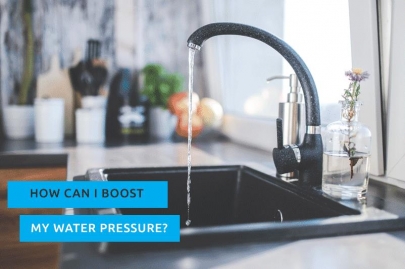
If you have low water pressure despite owning a relatively new system, there are a number of possible reasons. This could be as simple as your pipes being blocked but if you've recently flushed the system or it's a new installation, it's possible you're receiving a low pressure water supply from your provider. If this is the case, you might be best served by installing a water pressure booster in order to bring the pressure up to the level you require.
Before making any significant changes to your system, it's worth pressure testing to evaluate it properly. Take a moment to check that the shutoff valves are fully open, as this is a simple fix that could save you the cost of having to call out a plumber. If you live in a city, it could be possible to ask your local water provider for the current water pressure, ideally somewhere between 45 and 55 psi.
Alternatively, it's possible to test the water pressure in your home by purchasing a pressure gauge, available from many DIY suppliers. If you have an outdoors water spigot, this will be the easiest place to connect the gauge and get a quick and accurate reading. If the water pressure is already suitable, it's likely that the problem lies somewhere within your system and that a blockage or small pipes are causing your issues. If you do have low pressure, it's possible that your water supply is at fault and it might be worth investing in a water pressure booster.
A pressure booster can be attached to your system, which enhances your water pressure with a pump and pressure tank. This allows you to make whichever adjustments you require by simply operating a dial on the booster until you reach your desired water system pressure. The pressure tank contains a pressurised water reserve to avoid having to use the electric pump each time somebody uses a plumbing appliance. However, if multiple showers are in use when the pump is active, you'll notice far better water pressure from each of them. The cost of water pressure boosters varies greatly depending on the size of your property, the amount of plumbing and how much you need to boost the system by, so it may take some research to find the right choice for your home.
You'll likely want to install a reduced pressure valve and backflow preventer as well to ensure your system is as safe as possible and doesn't interfere with the surrounding water supply. If you already have a PRV (pressure-reducing valve) attached to your water supply, make sure it's set correctly for your preferred water pressure. They can also degrade over time and their ability to accurately control pressure can deteriorate. If your PRV is getting old, it may be best to replace it. This shouldn't be particularly costly and you can replace the valve easily enough. PRVs are essential if your water pressure is too high (over 80 psi), which can damage your appliances, heating system and waste energy and money.
If your plumbing is mostly adequate for your needs but your shower water pressure is lacking, it might not be worth trying to enhance the pressure of your entire system. Instead, it is possible to boost the strength of your shower individually with a pump at a lower cost and with less effort. Another simple solution is a low pressure shower head, which is specifically designed to utilise a reduced water flow in such a way that it cleans to the same extent as higher pressure showers. A power shower can also make the most of your existing water pressure, so long as the unit is receiving enough water to function properly. Another option is installing a cold water accumulator to function alongside an electric shower. By storing up water, your shower will have enough to clean with and the immediate heating of an electric shower means that you won't have to worry about warming a hot water reserve in advance.
Shower door leaks are frustrating because water escaping onto bathroom floors creates slip hazards, damages flooring, and suggests something's wrong despite the shower looking fine when not in use. Most leaks have straightforward causes that you can diagnose and fix yourself without calling professionals or replacing the entire door. Let’s take a look at how to identify where water's escaping, and how to actually stop it.
Bathroom vanities take constant punishment from water, humidity, cosmetics, and cleaning products. Proper maintenance can extend their lifespan dramatically - but neglect leads to premature failure even with quality units.
Choosing between bifold and sliding shower doors seems straightforward until you start comparing them properly - that’s when you realise each has distinct advantages and compromises that suit different situations.